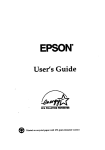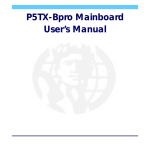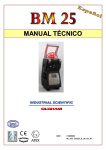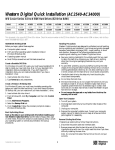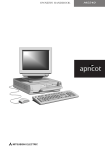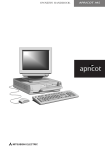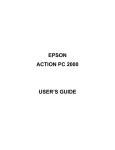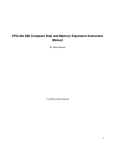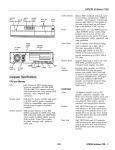Download Seagate ST5660A User`s manual
Transcript
Intel 430TX PCI Chipset Intelligent MAIN BOARD ATX586 for Dual CPUs ATX Factor TX2 for AT Factor / Wide SCSI USER’S MANUAL version 1.0 UPDATE INFORAMTION JULY 22, 97 1) When you install ATX power supply, please connect CASE STANDBY to front panel connector CN9/JP9 , pin 19-20 Power On. Then turn on ATX power supply. 2) The difference between TX2 and TX3 is that TX3 is without SCSI port/chip. Others are the same. 2 CONTENT Preface .................................................................. 1 CHAPTER 1 Hardware Installation for ATX586 1.1 One Jumper to Set CPU.....................… 1.2 Two Jumper to Set CPU.........… … … … … 1.3 Other Hardware Jumpers......................... 1.4 Install System DRAM Memory............... 1.5 Install IDE, I/O and Front Panel........… … . 1.6 I/O Address And IRQ................................ 1.7 Jumpers List............................................. 1.8 Pin Definition for Cable Connection........ 4 CHAPTER 2 PNP BIOS SETUP....................... 2.1 BIOS Setup............................................... 2.2 Standard Setup......................................... 2.3 BIOS Features Setup............................... 2.4 Chipset Features Setup............................ 2.5 Power Management Setup....................... 4 6 7 8 10 12 12 13 15 15 15 16 17 17 3 2.6 Configuration............................. 2.7 Peripherals.............................. 2.8 AWARD Code......................... PNP/PCI 18 Integrated 18 Post 19 CHAPTER 3 EIDE & FLASH BIOS SETUP...... Part I. Installation Ultra EIDE Driver............... Part II. Update Flash BIOS............................. 24 4 BIOS 24 48 CHAPTER 4 Hardware Installation for TX2 4.1 One Jumper to Set CPU.....................… 4.2 Two Jumper to Set CPU.........… … … … … 4.3 Other Hardware Jumpers......................... 4.4 Install System DRAM Memory............... 4.5 Install IDE, I/O and Front Panel........… … . 4.6 I/O Address And IRQ................................ 4.7 Jumpers List............................................. 4.8 Pin Definition for Cable Connection........ 49 50 52 53 54 56 58 58 59 5 Preface Inside the Document This document describes setup ATX586 Dual Pentium Main Board with Intel 430TX PCI CHIPSET, resulting in Ultra IDE performance. ATX586 is for ATX platform with dual processors design, including Enhance I/O chip (SMC 669 compatible). There is an option that installing “ 82093AA” supports two Intel Pentium (MMX) CPU, said Dual Processors. Under single processor, the user installs Intel + Pentium 75-233Mhz, MMX, AMD K5/K6-PR 233, CYRIX CX6x86 200 . Excepting above mentioned, ATX586 is designed with Auto Switching between 3.3v and 2.8v CPU (when you use single CPU only), front panel connector and Smart Jumper Setting for different CPU. The package for ATX586 including: þ ATX586 mother board þ Two IDE drive ribbon cable for 4 devices þ One Floppy ribbon cable for 2 devices þ One Ultra IDE device disk þ This user’ s manual Chapter 1 is about positions, jumpers and connectors for ATX586. Due to the board supports full range of Pentium CPU MMX 75Mhz-233Mhz, AMD K5/K6-PR233, CYRIX 6x86 CX 200+ . Chapter 2 is for BIOS setup. If you want to use external I/O card, you can disable the I/O function in BIOS and then install a card on slot. You also modify the COM1 and COM2 as COM3 and COM4 in BIOS. Finally, the BIOS is PnP function. It auto detects the PCI IRQ, ISA IRQ and HDD mode. Chapter 3 is for IDE DRIVER installation and how to upgrade BIOS. 6 (Chapter 4 is about positions, jumpers and connectors for TX2. Due to the board supports full range of Pentium CPU MMX 75Mhz+ 233Mhz, AMD K5/K6-PR233, CYRIX 6x86 CX 200 .) Simple features: ² Intel 430 TX PCISET. 82439TX System Controller (MTXC), 82371AB PIIX4 PCI to ISA / IDE Xcelerator, 82093AA I/O Advanced Programmable Interrupt Controller (IOAPIC). ² Compatible SMC 669 super I/O on board. ² Supports full range of Pentium Processor Family, up to Intel +. Pentium MMX-233Mhz, AMD K6-PR-233, CX 6x86 200 is an auto- switching mode from ² There 3.3v to 2.8v. Installing (option) 82093AA to let the board supports two Intel Pentium or MMX CPU at the same board for ATX586. It is perfect to run the same voltage CPU! ² Support SDRAM/EDO/Fast page DRAM, 72-pin SIMM socket * 4pcs, 168-pin DIMM socket * 2pcs. 256MB. ² 6-1-1-1 for SDRAM; 5-2-2-2 for EDO; 6-3-3-3 for FP. 64-MB DRAM cacheability. back only. ² 2 pairs/4 banks up to Direct Mapped organization-write Supports 256K and 512K Pipelined Burst SRAM. PCI V2.1 compatible. Concurrent PCI, enhanced CPU/PCI/ISA performance. ² Provides Multiprocessor Interrupt Management: dynamic interrupt distribution routing interrupt to the lowest priority processor; software programmable control of interrupt inputs; off loads interrupt related traffic from the memory bus. 7 ² 24 Programmable Interrupts: 13 ISA supported; 4 PCI; 1 interrupt/ SMI# rerouting; 2 motherboard ; 1 interrupt used for INTR input; 3 general purpose; independently programmable for edge/level sensitivity interrupts; each interrupt can be programmed to respond to active high or low inputs. ² 4 * 32-bit PCI, 4 * 16 bit ISA Slots for ATX586 ² 2 * Ultra EIDE, support 4 IDE devices. EPP/ECP/SPP printer port. 2 * 16550 UART serial ports. PS/2 mouse port. IR, infrared, port, option for FIR, fast infrared. ² IDE controller: 2 * USB, universal serial bus, ports. Independent timing of up to 4 drives. PIO mode 4 transfers up to 14 Mbytes/sec. Supports “ Ultra 33” synchronous DMA mode transfers up to 33 Mbytes/sec. Integrated 8*32-bit buffer for IDE PCI Burst transfers. ² Dual Power Supply. on board to Has both AT and ATX power connectors support AT or ATX power supply with soft-on/off features. ² Built-in AWARD PCI/ISA Plug and Play Flash BIOS GREEN BIOS ² Two-mega flash recovery BIOS ROM. &&& 8 Chapter 1 Hardware Installation For ATX586 1.1 One Jumper to Set CPU , Simple Jumper No more CPU jumper setting when you use Single Processor Intel 133Mhz, +, CYRIX 166 AMD K5-133 CPU. You just install CPU directly and Power On. (At the moment, JP6: 12 and JP7: 2-3 SHORT; JP8/JP9: 1-2 SHORT ) A: Using Intel CPU (Ensuring JP8/JP9: 1-2 SHORT) CPU Speed JP6 JP7 Intel 100Mhz 1-2 SHORT 1-2 SHORT Intel 166Mhz 2-3 SHORT 2-3 SHORT Intel 200Mhz 2-3 SHORT 1-2 SHORT Intel 233Mhz 1-2 SHORT 1-2 SHORT B: Using AMD K5/K6 (Ensuring JP8/9: 1-2 SHORT) CPU Speed JP6 JP7 AMD K5-100 1-2 SHORT 1-2 SHORT AMD K5/K6-PR-166 2-3 SHORT 2-3 SHORT AMD K6-PR200 2-3 SHORT 1-2 SHORT AMD K6-PR233 1-2 SHORT 1-2 SHORT C: Using CYRIX 6x86 CPU ( Ensuring JP6: 1-2 and JP7: 2-3 SHORT) CPU Speed JP8 JP9 CX 133+, 55Mhz 2-3 SHORT 2-3 SHORT CX 150+, 60Mhz 2-3 SHORT 1-2 SHORT CX 200+, 75Mhz 1-2 SHORT 2-3 SHORT When you want to install two CPU, they are perfect are the same voltage 2.8v (P55C) or 3.3v(P54C). Different voltage can’t be used together. Installing the 1st CPU at U4 socket! 9 Map of ATX586 Mother Board Default Setting for Intel Pentium 133Mhz, AMD K5-133,CYRIX P166+ ,512K PB Cache 1.2 10 Two-Jumper Setting for CPU JP6/JP7: Set CPU External Bus Frequency Rate (BF1, BF0) JP6/JP7: 1-2, SHORT for Intel 90/100Mhz, MMX 233Mhz, AMD K5 75-133, AMD K6 PR233Mhz JP6: 1-2 and JP7: 2-3 SHORT for Intel 120/ + 133 Mhz, CYRIX 120 + 200 (Default) JP6/JP7: 2-3 SHORT for Intel MMX150/166Mhz, AMD K6 PR166Mhz means BF0. NON-ACTIVE) JP6: 2-3 SHORT and JP7: 1-2 SHORT for Intel MMX 180/ 200Mhz,and AMD K6 PR200. (JP6 means BF1 and JP7 When 2-3 short means ACTIVE, 1-2 short means 11 JP8/9: Set CPU External Bus Frequency Selection (FS0, FS1, FS2) JP8: 1-2 and JP9: 2-3 SHORT : 75Mhz for CX + 200 JP8/9:1-2 SHORT: 66 + Mhz for CX 166 , AMD K6, MMX. Intel/AMD 100/133/ 166/ 200 / 233Mhz (Default) JP8: 2-3 and JP9: 1-2 SHORT : 60Mhz for CX +, 150 Intel/AMD 90/120/150 /180Mhz CPU + JP8/9: 2-3 SHORT: 55Mhz for CX133 1.3 Other Hardware Jumpers J1: Set the CPU Type: when you install two CPUs please use J1 to indicate the Voltage of CPU. If you only install one CPU, skip this part à OPEN for P55C(Intel MMX, AMD K6, CYRIX 6x86L CPU. Default. 2.8v à 12 1-2, 3-4, 5-6, 7-8 SHORT indicates Intel P54C (AMD K5 and CYRIX 6x86). 3.3v only JP15: 2MB FLASH BIOS ONLY 2-3 SHORT for normal (set by factory). Default. 1-2 SHORT reserved for factory set only. JP16: Select FLASH BIOS 2-3 SHORT for 5v Flash BIOS, normal, Default.. 1-2 SHORT for 12v Flash BIOS (set by factory), JP18: Choose Power Supply SHORT: AT style power supply OPEN: ATX style power supply JP13: CMOS. When you forget the password, clear CMOS, restart! 2-3 SHORT for normal. Default. 3-4 SHORT to clear CMOS (power must be off). OPEN for external battery installed. It is an important jumper. When BIOS setting is changed by user becoming unstable in system board, or I/O don’ t work properly, reset CMOS RAM data ( default setup.) JP2: Set Cache. Don’ t change it by users! 2-3 SHORT: 512K PB SRAM. Default. 1-2 SHORT: 256K PB SRAM 13 JP12: Choose CPU SMI Mode 1-2 SHORT: SMI by PIIX4 ( Single CPU request SMI), Default. 2-3 SHORT: SMI by IOAPIC (Dual CPU request SMI) 1.4 Install System DRAM Memory The board supports 2pcs 72-pin, 32-bit SIMMs (Single Inline Memory Modules) and 2pcs 168-pin, 64-bit DIMM (Dual Inline Memory Modules) of 4, 8, 16, 32MB to form a memory size between 8MB to 128MB. The SIMMs can be 60ns or 70ns Fast Page Mode (FPM), or Enhanced Data Out (EDO) (BEDO & Parity are not supported). SIMMs must be installed in pairs so that each bank (see Map of ATX-586)contains 64-bit of same memory chips. DIMM can be used as one bank. It is available for 3.3v (power level) Unbuffered Synchronous DRAM (SDRAM) or EDO DRAM of either 8, 16, 32, 64, 128MB, to form a memory size between 8MB to 128MB. SIMM and DIMM can be used together, but the limitations are two banks and max memory size 128MB. 2pcs 72-pin SIMM is one bank and 1pce DIMM is one bank too. Bank 0 1MB * 32 SS 1MB * 32 SS 1MB * 32 SS 1MB * 32 SS 1MB * 32 SS 2MB * 32 DS 2MB * 32 DS 2MB * 32 DS 2MB * 32 DS 2MB * 32 DS 4MB * 32 SS 4MB * 32 SS 4MB * 32 SS 4MB * 32 SS 4MB * 32 SS 14 Bank 1 X 1MB * 32 SS 2MB * 32 DS 4MB * 32 SS 8MB * 32 DS X 1MB * 32 SS 2MB * 32 DS 4MB * 32 SS 8MB * 32 DS X 1MB * 32 SS 2MB * 32 DS 4MB * 32 SS 8MB * 32 DS TOTAL 8MB 16MB 24MB 40MB 72MB 16MB 24MB 32MB 48MB 80MB 32MB 40MB 48MB 64MB 96MB 8MB * 32 DS 8MB * 32 DS 8MB * 32 DS 8MB * 32 DS 8MB * 32 DS 16MB * 32SS 16MB * 32SS 1.5 X 1MB * 32 SS 2MB * 32 DS 4MB * 32 SS 8MB * 32 DS X 16MB * 32SS 64MB 72MB 80MB 96MB 128MB 128MB 256MB Install IDE, Enhanced I/O and Front Panel Connectors There is a special design that CN9 is for Key Lock, Sleep/Resume SW, Speaker, IDE LED, TB SW, Reset SW, and Turbo LED. It is convenient for you to connect the cable from front board of Case. CN9: 1-5, Key Lock - Keyboard lock switch & power LED connector. 1. Power LED (+), 2. N/C, 3. GND, 4. Key lock, 5. GND CN9: 7-8, Turbo Switch. CN9: 10-13, Speaker - Connect to the system's speaker for beeping. 10. Speaker, 11. GND, 12. GND, 13. VCC. CN9: 14-15, IDE LED Indicator - LED ON when on board PCI IDE HDD activities. CN9: 19-20, Turn on power when ATX power supply is on sleep mode CN9: 22-23, Reset - Short to restart system. CN9: 25-26, Turbo LED Indicator - LED ON when high speed (CN9: 7-8 SHORT). 15 JP17: IR, fast infrared port. PIN-1: IRRX, PIN-2: GND; PIN-3: IRTX; PIN-4: VCC COM1-2/CN1-CN5: Support 16550 high speed serial ports/ UART. PS/2 Mouse CN2: PS/2 mouse port. 5-pin Mouse: LPT/CN4: Printer port with ECP/ PP. bi-direction. It can be used with external IDE/ SCSI device. AT POWER CONNECTOR/CN6: For normal AT style power supply ATX POWER CONNECTOR/CN7: For ATX factor style power supply USB1/: 4-PIN connectors. PIN-1: VCC(5V), PIN-2: USB-, PIN-3: USB+, PIN-4: GND 16 IDE 1: Primary IDE port to support ATAPI Mode 5 IDE devices IDE 2: Secondary IDE port to support ATAPI Mode 5 IDE devices. FDC/CN8: Support 2 FDD up to 1.44MB or 2.88MB . 1.6 I/O Address and IRQ/DRQ I/O Address and IRQ On Board I/O Address GAME 200-20F COM1 3F8-3FF COM2 2F8-2FF COM3 3E8-3EF COM4 2E8-2EF IDE1 1F0-1F7 IDE2 170-177 LPT1 378-37F LPT2 278-27F LPT3 3BC-3BF FDD1 3F0-3F7 PS/2 MOUSE X 1.7 IRQ X 4 3 3 3 14 15 7 7 7 6 12 DRQ X X X X X X X 3 (ECP) 3 (ECP) 3 (ECP) 2 X Jumpers and Connectors List ITEMS DESCRIPTION JP2 1-2 for 256K Cache, JP6 Set CPU External Bus Frequency Rate (BF0, BF1) JP7 Set CPU External Bus Frequency Rate (BF0, BF1) 3-4 for 512K Cache 17 JP8 Set CPU External Bus Frequency (FS0, FS1, FS2) JP9 Set CPU External Bus Frequency (FS0, FS1, FS2) JP12 Choose CPU SMI Mode JP13 2-3 Normal CMOS, 3-4 CMOS Clear JP15 Select Recovery BIOS JP16 2-3 for 5v Flash BIOS, 1-2 for 12v JP17 IR Connector JP18 Choose Power Supply J1 Indicate the CPU voltage CN1 COM1 CN2 PS/2 MOUSE Connector CN3 Keyboard CN4 Parallel Port CN5 COM2 CN6 AT Power Supply CN7 ATX Power Supply Connector CN8 Floppy Drive CN9 Front Panel Connector USB1 USB Connector IDE1-2 IDE Drive connector &&& 18 Connector 19 Chapter 2 AWARD, PnP GREEN BIOS SETUP 2.1 BIOS Setup Powe on the computer and press <DEL> key immediately and the screen will display you CMOS SETUP UTILITY as follows: ROM PCI/ISA BIOS (2A59GT4A) CMOS SETUP UTILITY AWARD SOFTWARE, INC. STANDARD CMOS SETUP INTEGRATED PERIPHERALS BIOS FEATURES SETUP SUPERVISOR PASSWORD CHIPSET FEATURES SETUP USER PASSWORD POWER MANAGEMENT SETUP IDE HDD AUTO DETECTION PNP/PCI CONFIGURATION HDD LOW LEVEL FORMAT LOAD BIOS DEFAULTS SAVE & EXIT SETUPG LOAD SETUP DEFAULTS EXIT WITHOUT SAVING Esc : Quit ↑↓←→: Select Item F10 : Save & Exit Setup (Shift) F2: Change Color Time, Date, Hard Disk Type....... 2.2 Standard CMOS Setup The STANDARD CMOS SETUP allows user to configure system setting such as current date and time, type 20 of hard disk drive installed in the system, floppy drive type, and the type of display monitor. ROM PCI/ISA BIOS (2A59GT4A) STANDARD CMOS SETUP AWARD SOFTWARE, INC. Date (mm:dd:yy) Time (hh:mm:ss) HARD DISKS Primary Master: Primary Slave: Secondary Master: Secondary Slave: : Wed, Jan 5 2000 :0: 0:0 TYPE NONE NONE NONE NONE SIZE 0 0 0 0 CYLS 0 0 0 0 HEADS 0 0 0 0 PRECOMP 0 0 0 0 Drive A: 1.2M, 5.25 in Drive B: None LANDZ 0 0 0 0 SECTOR 0 0 0 0 Base Memory: Extended Memory: Other Memory: --------------------------Total Memory: Video: EGA/VGA Halt On: All Errors áâàß: Select Item (Shift) F2: Change Color Esc: Quit F1: Help 2.3 Pu/Pd/+/-: Modify BIOS Features Setup ROM PCI/ISA BIOS (2A59GT4A) BIOS FEATURES UTILITY AWARD SOFTWARE, INC. Virus Warning CPU Internal Cache External Cache Quick Power On Self Test Boot Sequence Swap Floppy Drive Boot Up Floppy Seek Boot Up NumLock Status Boot Up System Speed Gate A20 Option Typematic Rate Setting Typematic Rate (Chars/Sec) Typematic Delay *Msec) Security Option PCI/VGA Palette Snoop : Disable : Enabled : External : Disable : A,C : Disable : Enabled : On : High : Fast : Disabled :6 : 250 : Setup : Disabled Video BIOS Shadow C8000-CBFFF Shadow CC000-CFFFF Shadow D0000-D3FFF Shadow D4000-D7FFF Shadow D8000-DBFFF Shadow DC000-DFFFF Shadow : Enabled : Disabled : Disabled : Disabled : Disabled : Disabled : Disabled ↑↓←→: Select Item F1 : Help F5 : Old Values F6: Load BIOS Defaults PU/PD/+/- : Modify (Shift)F2 : Color 21 MODE ----------------------------- 640K 3072K 384K --------------4096K OS Select for DRAM >64MB 2.4 : NONOS2 F7 : Load Setup Defaults Chipset Features Setup ROM PCI/ISA BIOS (2A59GT4A) CHIPSET FEATURES SETUP AWARD SOFTWARE, INC. Auto Configuration Fast EDO path Select Refresh RAS# Assertion ISA Bus Clock : Enabled : 60ns :3 :6 :3 :3 :x222/x333 :1 : Disabled : 4 CLKS : PCICLK/4 System BIOS Cacheable Video BIOS Cacheable 8 Bit I/O Recovery Time 16 Bit I/O Recovery Time Memory Hole At 15M-16M Peer Concurrency Passive Release : Disabled : Disabled :1 :1 : Disabled : Enabled : Enable DRAM Timing DRAM RAS# Precharge Time DRAM R/W Leadoff Timing DRAM RAS To Cas Relay DRAM Read Burst(EDO?FP) DRAM Write Burst Timing Fast MA To RAS# Delay CLK 2.5 DRAM Fast Leadoff Delayed Transaction : Disabled : Disabled ↑↓←→: Select Item F1 : Help F5 : Old Values F6: Load BIOS Defaults F7 : Load Setup Defaults PU/PD/+/- : Modify (Shift)F2 : Color Power Management Setup ROM PCI/ISA BIOS (2A59GT4A) POWER MANAGEMENT SETUP AWARD SOFTWARE, INC. Power Management PM Control by APM Video Off Method Modem Use IRQ Doze Mode Standby Mode Suspend Mode HDD Power Down : User Define : Yes ** Wake Up Events In Doze IRQ3 (Wake-Up Event) IRQ4 (Wake-Up Event) IRQ8 (Wake-Up Event) IRQ12 (Wake-Up Event) & Standby ** : ON : ON : ON : ON 22 : V/H SYNC+Blank :3 : 1 Min : 1 Min : 1 Min : I Min **power Down & IRQ3 (COM2) IRQ4 (COM1) IRQ5 (LPT2) IRQ6 (Floppy Disk) IRQ7 (LPT1) IRQ8 (RTC ALARM) IRQ9 (IRQ2 Redir) IRQ10 (Reserved) IRQ11 (Reserved) IRQ12 (PS/2 Mouse) IRQ13 (Coprocessor) IRQ14 (Hard Disk) IRQ15 (Reserved) ↑↓←→: Select Item F1 : Help F5 : Old Values F6: Load BIOS Defaults F7 : Load Setup Defaults Resume Events ** : ON : ON : ON : OFF : ON : OFF : ON : ON : ON : ON : ON : ON : ON PU/PD/+/- : Modify (Shift)F2 : Color 2.6 PNP/PCI Configuration ROM PCI/ISA BIOS (2A56GT5A) PNP/PCI CONFIGURATION AWARD SOFTWARE, INC. Resources Controlled By Reset Configuration Data : Manual : Enabled IRQ-3 assigned to IRQ-4 assigned to IRQ-5 assigned to IRQ-7 assigned to IRQ-9 assigned to IRQ-10 assigned to IRQ-11 assigned to IRQ-12 assigned to IRQ-14 assigned to IRQ-15 assigned to DMA-0 assigned to DMA-1 assigned to DMA-5 assigned to DMA-6 assigned to DMA-7 assigned to : Legacy ISA : Legacy ISA : Legacy ISA : Legacy ISA : Legacy ISA : Legacy ISA : Legacy ISA : Legacy ISA : Legacy ISA : Legacy ISA : Legacy ISA : Legacy ISA : Legacy ISA : Legacy ISA : Legacy ISA : 2.7 PCI IRQ Actived By PCI IDE IRQ Map To primary IDE INT# Secondary IDE INT# Used Mem Base Addr ↑↓←→: Select Item F1 : Help F5 : Old Values F6: Load BIOS Defaults F7 : Load Setup Defaults : Level : PCI-AUTO :A :B : N/A PU/PD/+/- : Modify (Shift)F2 : Color Integrated Peripherals ROM PCI/ISA BIOS (2A59GT5A) INTEGRATED PERIPHERALS AWARD SOFTWARE, INC. IDE HDD block Mode IDE Promary Master PIO IDE Primary Slave PIO IDE Secondary Master PIO IDE Secondary Slave PIO On-chip Primary PCI IDE On-Chip Secondary PCI IDE Onboard FDD Controller Onboard Serial Port 1 Onboard Serial Port 2 UART 2 Mode Onboard Parallel Port Onboard Parallel Mode : Enabled : Auto : Enabled : Auto : Auto : Auto : Enabled : Enabled : Enabled : 3F8/IRQ4 : 2F8/IRQ3 : Standard :378H/IRQ7 : SPP : 2.8 USB Controller ↑↓←→: Select Item F1 : Help F5 : Old Values F6: Load BIOS Defaults F7 : Load Setup Defaults PU/PD/+/- : Modify (Shift)F2 : Color AWARD BIOS Post Code 23 POST (hex) C0 C1 C3 C5 01-02 03 04 05 06 07 BE 09 0A 0B 24 Description 1. Turn off OEM specific cache, shadow... 2. Initialize all the standard devices with default values standard devices includes: -DMA controller (8237), -Programmable Interrupt Controller (8259), -Programmable Interval Timer (8254), -RTC chip Auto-detection of onboard DRAM & Cache 1. Test system BIOS checksum 2. Test the first 256K DRAM 3. Expand the compressed codes into temporary DRAM area including the compressed System BIOS & Option ROMs Copy the BIOS from ROM into E0000-FFFFF shadow RAM so that POST will go faster Reserved Initialize EISA registers (EISA BIOS only) Reserved 1. Keyboard Controller Self-Test 2. Enable Keyboard Interface Reserved Verifies CMOS’s basic R/W functionality Program defaults values into chipset according to the MODBINable Chipset Default Table 1. Program the configuration register of Cyrix CPU according to the MODBINable Cyrix Register Table 2. OEM specific cache initialization (if needed) 1. Initialize the first 32 interrupt vectors with corresponding Interrupt handlers;Initialize INT no from 33-120 with Dummy(Suprious); Interrupt Handler. 2. Issue CPUID instruction to identify CPU type 3. Early Power Management initialization (OEM specific) 1. Verify the RTC time is valid or not 2. Detect bad battery 0C 0D 0E 0F 10 11 12-13 14 15 16 17 19 1A1D 3. Read CMOS data into BIOS stack area 4. PnP initializations including (PnP BIOS only) -Assign CSN to PnP ISA card -Create resource map from ESCD 5. Assign IO & Memory for PCI devices (PCI BIOS only) Initialization of the BIOS Data Area (40 : 0N − 40:FF) 1. Program some of the Chipset’s value according to Setup. (Early Setup Value Program) 2. Measure CPU speed for display & decide the system clock speed 3. Video initialization including Monochrome,CGA,EGA / VGA. If no display device found, the speaker will beep 1. Initialize the APIC (Multi-Processor BIOS only) 2. Test video RAM (If Monochrome display device found) 3. Show messages including: -Award Logo, Copyright string, BIOS Date code & Part No. -OEM specific sign on messages -Energy Star Logo (Green BIOS ONLY) -CPU brand, type & speed -Test system BIOS checksum(NonCompress Version only) DMA channel 0 test DMA channel 1 test DMA page registers test Reserved Test 8254 Timer 0 Counter 2. Test 8259 interrupt mask bits for channel 1 Test 8259 interrupt mask bits for channel 2 Reserved Test 8259 functionality Reserved 25 1E 1F-29 30 31 32 33-3B 3C 3D 3E 3F-40 BF 41 42 43 44 45 46-4D 4E 4F 26 If EISA NVM checksum is good, execute EISA initialization (EISA BIOS only) Reserved Detect Base Memory & Extended Memory Size 1. Test Base Memory from 256K to 640K 2. Test Extended Memory from 1M to the top of memory 1. Display the Award Plug & Play BIOS Extension message (PnP BIOS only) 2. Program all onboard super I/O chips (if any) including COM ports, LPT ports, FDD port... according to setup value Reserved Set flag to allow users to enter CMOS Setup Utility 1. Initialize Keyboard 2. Install PS2 mouse Try to turn on Level 2 cache Note: Some chipset may need to turn on the L2 cache in this stage. But usually, the cache is turn on later in POST 61h Reserved 1. Program the rest of the Chipset’s value according to Setup. (Later Setup Value Program) 2. If auto-configuration is enabled, programmed the chipset with pre-defined values in the MODBINable AutoTable Initialize floppy disk drive controller Initialize Hard drive controller If it is a PnP BIOS, initialize serial & parallel ports Reserved Initialize math coprocessor. Reserved If there is any error detected (such as video, kb...), show all the error messages on the screen & wait for user to press <F1> key 1. If password is needed, ask for password 2. Clear the Energy Star Logo (Green BIOS only) 50 51 52 53 60 61 62 Write all CMOS values currently in the BIOS stack area back into the CMOS Reserved 1. Initialize all ISA ROMs 2. Later PCI initializations (PCI BIOS only) -assign IRQ to PCI devices -initialize all PCI ROMs 3. PnP Initializations (PnP BIOS only) -assign IO, Memory, IRQ & DMA to PnP ISA devices -initialize all PnP ISA ROMs 4. Program shadows RAM according to Setup settings 5. Program parity according to Setup setting 6. Power Management Initialization -Enable/Disable global PM -APM interface initialization 1. If it is NOT a PnP BIOS, initialize serial & parallel ports 2. Initialize time value in BIOS data area by translate the RTC time value into a timer tick value Setup Virus Protection (Boot Sector Protection) functionality according to Setup setting 1. Try to turn on Level 2 cache Note: if L2 cache is already turned on in POST 3D, this part will be skipped 2. Set the boot up speed according to Setup setting 3. Last chance for Chipset initialization 4. Last chance for Power Management initialization (Green BIOS only) 5. Show the system configuration table 1. Setup daylight saving according to Setup value 2. Program the NUM Lock, typematic rate & typematic speed according to Setup setting 27 63 FF &&& 28 1. If there is any changes in the hardware configuration, update the ESCD information (PnP BIOS only) 2. Clear memory that have been used 3. Boot system via INT 19H System Booting. This means that the BIOS already pass the control right to the operating system Chapter 3 Quick Installation Guide Ultra IDE Driver and Update Flash BIOS for Intel TX Chipset Thise Chapter includes two parts: one is to instal Enhance IDE Driver and the other is to update main board BIOS. PART 1. Installation IDE driver: Dear Customer, Thank you for choosing the Intel PIIX Bus Master IDE Drivers. This production release of the drivers provides support for Intel PCIsets. To install the drivers, follow the steps below: 1. For all drivers: execute the appropriate self-extracting archive. Windows 95* archive - bmide_95.exe Windows NT* archive - bmide_nt.exe IBM OS/2* archive - bmideos2.exe This will place the SETUP files in a subdirectory on your hard disk. 2. For all drivers: run the setup program. Click on SETUP.EXE from Windows* File Manager/Explorer OR Execute Program/Run from the Program Manager. 3. Driver Installation For the Windows 95 Driver: [See auto install procedures.] 29 [If using OEM Version of Windows 95 CD-ROM on PIIX3 based systems see also " 82371SB PIIX3 Application Note #3 Microsoft Windows 95* Support for PIIX3 IDE Controller".] For the IBM OS/2 and Windows NT Drivers: After running SETUP, follow the installation instructions in the README.TXT file which is extracted to the driver installation directory. The Driver Version Numbers included in this release are: Windows 95 Driver - version 2.61 Windows NT Driver - version 1.59 IBM OS/2 Driver - version 2.05 Sincerely, PCIsets Product Line Marketing PCI Components Division Intel Corporation *Other brands and names are the properties of their respective owners **************************************************** PIIX Bus Master IDE Drivers for Windows 95* Installation, Usage, and Release Note Information NOTE: This document refers to desktop systems with the following Intel PCIset devices: 82371FB (PIIX1), 82371SB (PIIX3) or 82371AB (PIIX4) in conjunction with the following Intel PCIsets: 430FX, 430HX, 430TX, 430VX and 440FX The terms "PIIX", "82371xB" refer to any/all of the following Intel PCIset devices: 82371FB, 82371SB, 82371AB Also, the term "processor" refers to the Pentium(R) processor, the Pentium(R) processor with MMX(tm) technology, the Pentium(R) Pro processor, and the Pentium(R) II processor ONLY. **************************************************************************** 30 ****************************************************************************** INTRODUCTION ****************************************************************************** This document describes the installation procedure and usage information for the PIIX Bus Master IDE Drivers for Windows 95*. Also included are release notes describing any problems or issues with the software which were known at the time of shipment. **************************************************************************** CONTENTS OF THIS DOCUMENT **************************************************************************** This document contains the following sections: 1. 2. 3. 4. 5. 6. 7. 8. System Requirements Contents of the Distribution Package Installing the Software Verifying Installation of the Software De-installing the Software Troubleshooting Identifying the Software Version Number Release Notes 8A. IDE Devices Supported By the Driver 8B. Applications Supported By the Driver 8C. Large (>528MB) IDE Fixed Disk Drive Support By the Driver 8D. Release-Specific Troubleshooting Information 8E. Revision History 8F. Release Testing Information **************************************************************************** 1. SYSTEM REQUIREMENTS **************************************************************************** This section describes system requirements for the PIIX Bus Master IDE Device Driver for Windows 95*. Refer to the Release Notes section of this document for additional information regarding this release. NOTE: This driver has been designed for and tested with Windows 95* only. This driver will only install on systems with Windows 95*. 31 1. The system must contain a supported Intel processor and chip set configuration: Chip set: Intel 430FX, 430HX, 430TX, 430VX and 440FX chip sets. Processor: Intel Pentium(R), Pentium(R) with MMX(TM) Technology, Pentium(R) Pro, and Pentium(R) II devices ONLY. 2. Ensure that a mouse is connected to the system. 3. One of the following versions of Windows 95* must be installed on the system prior to running utility program. Windows 95* 4.00.950 (Retail) Windows 95* 4.00.950a (OSR1) Windows 95* 4.00.950b (OSR2 without USB Supplement) Windows 95* 4.00.950b (OSR2.1 with USB Supplement) 4. This utility should only be used on desktop systems. The utility must not be executed on notebook or portable systems with or without dock. 5. It is assumed that the BIOS properly initialized the 82371xB IDE interface for Bus Master IDE operation. 6. There are no other non-82371xB IDE controllers (add-in IDE controller or sound card with IDE) enabled on the system. **************************************************************************** 2. CONTENTS OF THE DISTRIBUTION PACKAGE **************************************************************************** The Intel PIIX Bus Master IDE Driver for Windows 95*, Version 3.00 release package contains the following items: Date Time ------04/15/97 12:00a BMIDE_95.EXE 04/15/97 12:00a README.TXT 04/15/97 12:00a 03/28/97 12:00a 03/28/97 12:00a 03/28/97 12:00a 32 Size ---- 29,268 45,312 69,592 320,411 File ---- PIIXDRV.Z SETUP.EXE SETUP.INS _INST32I.EX_ 03/28/97 03/28/97 12:00a 12:00a 6,128 179,689 _SETUP.DLL _SETUP.LIB **************************************************************************** 3. INSTALLING THE SOFTWARE **************************************************************************** This installation procedure is specific only to the version of the driver and installation file included in this package. This subsection describes how to install the software on a system where Windows 95* is installed. NOTE: 1. 2. Record the location of the Windows 95* directory before installing the driver. Check the System Requirements. Windows 95* must be fully installed and running on the system prior to running this software. Close any running applications. 3. Remove references to installed real-mode IDE device drivers in the AUTOEXEC.BAT and CONFIG.SYS files (especially any drivers that control ATAPI CD-ROM and special IDE features). Use the Notepad utility to do this. 4. The driver files are stored in an integrated application setup program. This program is a Windows 95* program that allows the driver files to be INSTALLED or DE-INSTALLED. Execute the driver setup program. Run SETUP.EXE. 5. Click 'Next' on Welcome Screen to read and agree to the license agreement. View the text file and choose File\Exit to close Notepad and continue. NOTE: If you click 'No', program will terminate. 33 6. Click 'Yes' if you agree to continue. the program will terminate. 7. NOTE: If you click 'No', Select 'INSTALL', to install the PIIX Bus Master IDE Device Driver when prompted to do so. NOTE: if the driver is currently installed on the system, SETUP will ask you whether or not you want to continue. Follow the prompts on the screen to Install the driver if desired. 8. Click 'OK' to restart the system when prompted to do so. 9. Follow the screen instructions and use default settings to complete the setup when Windows 95* is re-started. Upon re-start, Windows 95* will display that it has found an Intel PCI Bus Master IDE controller hardware and is installing hardware for it. If a "New Hardware Found" dialog box is displayed requesting the location of the drivers, use the mouse to click on the scrollbar and click on the <Windows 95* directory>\System\IOSubSys path: For example: a. Click on 'C:\WINDOWS\SYSTEM\IOSUBSYS\' b. Click 'OK'. 10. Select 'Yes', when prompted to re-start Windows 95*. NOTE: After installation, the following driver and related files are stored as listed. <Windows 95* directory>\System\IOSubSys\IDEATAPI.MPD <Windows 95* directory>\System\IOSubSys\PIIXVSD.VXD <Windows 95* directory>\INF\IDEATAPI.INF **************************************************************************** 4. VERIFYING INSTALLATION OF THE DRIVER **************************************************************************** 34 This installation verification procedure is specific only to the version of the driver and installation file included in this package. This subsection describes how to verify installation of the software on a system where Windows 95* is installed. This installation verification procedure is specific only to the version of the driver and installation file included in this package. If the system does not operate reliably or fails to boot when the driver is installed, De-install the driver. Refer to the RELEASE NOTES section for more information. In order to verify the installation of the driver: 1. Open the Control Panel folder. 2. Invoke the System applet. 3. Click on the Device Manager tab. 4. Select the View Devices by Type option. connected to the system will be displayed. A list of the devices 5. Click on the Hard Disk Controllers record. will be listed. One of two cases For CASE 1, there could be up to three instances listed: Intel 82371XX PCI Bus Master IDE Controllers Primary Bus Master IDE Controller Secondary Bus Master IDE Controller Go to step 6 for CASE 1. For CASE 2, there could be up to two instances listed: Intel PIIX PCI Bus Master IDE Controller Intel PIIX PCI Bus Master IDE Controller Go to step 7 for CASE 3. NOTE FOR ALL CASES: a. The content of the text strings is dependent on the driver's INF file (named IDEATAPI.INF in the driver's install directory). 35 As a result, the individual controller descriptions may vary slightly from what is listed above. In this case, select the closest match. NOTES FOR CASE 1: b. XX in 82371XX, shown in CASE 1 may be: FB, SB, AB. c. Depending on your current system configuration, only one of the instances displayed for the Primary or the Secondary IDE controllers may be displayed. d. The order in which the individual hard disk controller instances are listed may vary. NOTE FOR CASE 2: e. Depending on the current system configuration, only one of the instances may be displayed. 6. Verify the Intel 82371xx PCI Bus Master IDE Controllers Driver listing. NOTES: a. A yellow mark on an instance is NORMAL if no devices are connected to that controller. b. If only one instance is present, there should be no yellow warning symbol next to it. If a yellow warning symbol appears in error (cannot be attributed to either of Steps 6a or 6b), the driver may not be installed and/or working properly. **************************************************************************** 5. DE-INSTALLING THE SOFTWARE **************************************************************************** This de-installation procedure is specific only to the version of the driver and installation file included in this package. This subsection describes how to install the software on a system where Windows 95* is installed. NOTE: 36 Record the location of the Windows 95* directory before de-installing the driver. 1. 2. 3. Check the System Requirements. Windows 95* must be fully installed and running on the system prior to running this software. Close any running applications. The driver de-installer is stored in an integrated application setup program. This program is a Windows 95* program that allows the driver files to be INSTALLED or DE-INSTALLED. Execute the driver setup program. Run SETUP.EXE. 4. Click 'Next' on Welcome Screen to read and agree to the license agreement. View the text file and choose File\Exit to close Notepad and continue. NOTE: If you click 'No', program will terminate. 5. Click 'Yes' if you agree to continue. the program will terminate. 6. Select 'DE-INSTALL', to install the PIIX Bus Master IDE Device Driver when prompted to do so. NOTE: If you click 'No', NOTE: if the driver is not currently installed on the system, SETUP will exit. 7. Click 'OK' to restart the system when prompted to do so. 8. Follow the screen instructions and use default settings to complete the setup when Windows 95* is re-started. Upon re-start, if Windows 95* if responds with an "Update Device Driver Wizard" dialog box (applies to systems with Windows 95* Version 950B) then follow the UPDATE DEVICE DRIVER WIZARD directions section, otherwise go to the NON-WIZARD directions. 37 NON-WIZARD directions: A. Select 'Windows default driver', A "New Hardware Found" dialog box will request a driver location. B. Select 'Yes' to restart the system when prompted to do so. Step C may happen several times. UPDATE DEVICE DRIVER WIZARD directions: A. Select 'Next', search for drivers. A Wizard dialog box requests to B. Select 'Finish', The Wizard dialog box will indicate it found a driver in the <Windows 95* directory>\INF directory. C. Select 'Yes' to restart the system when prompted to do so. Step C may happen several times. D. 4. Go to step 4, De-Installation process is complete. De-Install process is complete. **************************************************************************** 6. TROUBLESHOOTING **************************************************************************** The following procedure assumes that the hardware/software requirements from above have been satisfied. The following procedure also assumes that the installation of the driver was performed as described in the 'Verifying Installation of the Driver' section. Refer to the 'Release Notes' section of the document for additional information. COMMON PROBLEMS: **************************** 1. The device is incompatible with PCI Bus Master IDE operation. This is due to the fact that the device does not work properly when 38 accessed in a PCI Bus Master IDE fashion. Contact the device manufacturer for more information. 2. Verify the length of the cables that are being used to connect the IDE or ATAPI devices to the primary and secondary PIIX IDE interfaces. The length of these cables from END-TO-END should not exceed 18 inches (0.46 m). Furthermore, the capacitance of the cable should not exceed 35 pF. 3. A conflict between the PIIX Bus Master IDE driver and a realmode ATAPI CD-ROM or IDE device driver may occur if the realmode driver references have not been properly removed from the AUTOEXEC.BAT and/or CONFIG.SYS files. This conflict occurs when the PIIX Bus Master IDE driver attempts to access the legacy ISA IDE resources to control the PIIX. ALL REFERENCES TO REAL-MODE DRIVERS (IDE or ATAPI) IN THE TOEXEC.BAT AND CONFIG.SYS MUST BE REMOVED. **************************************************************************** 7. IDENTIFYING THE SOFTWARE VERSION NUMBER **************************************************************************** The driver's version can be determined by reading Windows* properties embedded in the driver file. The driver version can be obtained by querying the driver file's properties under File Manager. NOTE: After installation, the following driver and related files are stored as listed. <Windows 95* directory>\System\IOSubSys\IDEATAPI.MPD <Windows 95* directory>\System\IOSubSys\PIIXVSD.VXD <Windows 95* directory>\INF\IDEATAPI.INF 1. Under Windows 95*, invoke the "Explorer" application. 2. Select the path containing the driver file. <Windows 95* directory>\System\IOSubSys 39 For example, C:\WINDOWS\SYSTEM\IOSUBSYS 3. Select the driver file, "IDEATAPI.MPD". 4. Open the "File" menu. 5. Click on the "Properties" item. 6. Click on the "Version" tab. 7. The IDEATAPI.MPD driver's version should be listed in the 'Product Version' portion of the dialog. **************************************************************************** 8. RELEASE NOTES **************************************************************************** The release notes describe the current known state of the PIIX Bus Master IDE Driver for Windows 95*, Version 3.00 at the time of release. The release notes are divided into the following sections: 8A. 8B. 8C. IDE Devices Supported By the Driver Applications Supported By the Driver Large (>528MB) IDE Fixed Disk Drive Support By the Driver 8D. Release-Specific Troubleshooting Information 8E. Revision History 8F. Release Testing Information **************************************************************************** 8A. IDE DEVICES SUPPORTED BY THE DRIVER **************************************************************************** The Intel PIIX Bus Master IDE driver supports only specific ATA/ATAPI device types. The Intel driver should not be installed if the system is equipped with any of the non-supported ATAPI devices. The Intel PIIX Bus Master IDE driver supports the following devices connected to the PIIX IDE interface: - ATA fixed disk - ATAPI CD-ROM devices 40 The Intel driver does not support the following types of device in the system: - ATAPI Tape Drives - ATAPI CD-ROM Changer Drives - ATAPI DVD-ROM Drives - ATAPI Writeable CD Drives - ATA/ATAPI ZIP*, LS-120*, Cartridge, Optical, Removable Media Drives - IDE Fixed Disk Drives larger than 8.4GBbytes During initialization, the driver will auto-identify all the devices connected to the PIIX IDE interface. Depending on the capabilities of the devices connected to the system, the driver will initialize the PIIX IDE interface for bus mastering operation. Only drives identified as bus master capable will be accessed as a bus master; all other drives will be accessed in a PIO-only fashion. In general, bus mastering is possible for ATA/ATAPI devices that support the following DMA timing modes: Single Word DMA Mode 2 Multi-Word DMA Mode 1 Multi-Word DMA Mode 2 Ultra DMA Mode 0 Ultra DMA Mode 1 Ultra DMA Mode 2 These devices will be accessed by the driver in either a bus mastering or a PIO-fashion, depending on the specific transfer conditions. Devices that do not support the DMA timing modes listed above, or whose PIO timings are faster than their DMA timings, will be accessed in a PIO-fashion ONLY. For more information and a list of tested devices, see the 'Devices Tested' section of this document. **************************************************************************** 8B. APPLICATIONS SUPPORTED BY THE DRIVER **************************************************************************** 41 Advanced CD-ROM applications/features have not been tested with this driver. This driver does not support Microsoft SMART IOCTL API and any mobile IDE features on portable PCs (notebooks). If any problem is encountered, de-install the driver. The driver supports general CD-ROM operations such as: - File transfers - Data streaming - Audio The driver does not support the following applications: - Enhanced CD Applications such as VideoCD*, CDPlus* - Multi-CD changers - Applications used Microsoft SMART IOCTL API - Ontrack Disk Manager and EZ-Driver* API - Mobile IDE features on Notebooks **************************************************************************** 8C. LARGE IDE FIXED DISK DRIVE (>528MB) SUPPORT BY THE DRIVER **************************************************************************** Intel recommends that the "Auto" mode of disk recognition should be used in most systems' BIOS setup option when installing new disk drives. Some older systems may not support the large disk drives because of BIOS limitations. Users are encouraged to contact their system provider for the system or BIOS upgrade before installing the Intel driver for large drive support. Intel PIIX Bus Master IDE driver for Windows 95* supports the following fixed disk geometry translation mechanisms. Do not install the Intel driver if the system does not support them or the drive is not configured to use them. - Standard Cylinder-Head-Sector (CHS) translation in BIOS - Logical Block Addressing (LBA) mode - BIOS Disk Services INT13h, Function 08h to report the drive geometry parameters The Intel PIIX Bus Master IDE driver for Windows 95* does not support the certain disk geometry translation mechanisms. The user should use the default Microsoft Windows 95* IDE driver if the system uses the following translation mechanisms. - All other BIOS translation schemes not supported by 42 the driver. - Any software translation mechanisms, such as Ontrack Disk Manager*, EZ-Drive*, or master boot record hooking. **************************************************************************** 8D. RELEASE-SPECIFIC TROUBLESHOOTING INFORMATION **************************************************************************** Verifying the installation of the driver and other generic troubleshooting is discussed in the "TROUBLESHOOTING" section above. This section describes release-specific troubleshooting. This section contains a list of known problems with certain system configurations discovered during testing of the driver. A list of all storage devices tested with the driver is given below in the "RELEASE TESTING INFORMATION" section of this document. If the solution given to any of the problems listed below is to de-install the driver, follow the de-installation instructions outlined above in the "DE-INSTALLING THE SOFTWARE" section. In general, if the system fails to operate reliably, the recommendation isto de-install the PIIX Bus Master driver. Q1> Windows 95* doesn't recognize or see CD-ROM drive on the secondary IDE interface after system is restarted. A1> Some ATAPI CD-ROM drives may need to be placed on the same cable, as a slave, to a Hard Disk drive, which is configured as a Master. Below is a list of some CDROM drives that meet this requirement. Generally, with the exception of the devices listed below, the recommended configuration for a single ATAPI CD-ROM drive on a cable is as a Master. Mitsumi* FX400 XM5302B Sony* CDU55E XM5602B Sony* NEC* CDR251 Toshiba* NEC* CDR261 Toshiba* CDU76E NEC* CDR271 43 Torisan* CDR-C3G Torisan* CDR-S1G Q2> NEC* CDR272 NEC* CDR273 There is an Exclamation(!) or Question(?) mark next to the primary or secondary IDE controller instance under Device Manager where devices are connected. -ORThe secondary IDE controller instance is missing under Device Manager and devices are connected to this cable. A2> There are several possible causes for this issue: 1. Your CD-ROM drive may need be configurated as a slave drive. Please refer to Item A1 for a detailed description. 2. There is a hardware conflict in the system. Only TWO IDE channels are allowed in a system. The driver will not operate on systems that have a non-Intel IDE controller or a sound card with an IDE interface. The driver should not be de-installed on these systems. 3. The system BIOS may not have initialized the 82371xB IDE controller properly. Again, please contact your system provider for BIOS upgrade. If the system fails to operate reliably, de-install the driver. Q3> The system does not operate reliably the driver is installed. -OR- or fails to boot when The system fails to boot in NORMAL (non SAFE-MODE) mode when the driver is installed. A3> Please de-install the driver. Please make sure that your system meets the system requirements of the driver and you don't have any non- supported IDE devices or applications installed on the system. Please refer to the Release Notes section for supported devices and applications. 44 Q4> One or more of the IDE/ATAPI drives on the system fail to perform correctly and/or is not recognized by the driver. A4> Ensure devices on the system are connected according to the manufacturers' documentation. Please make sure that you don't have any non-supported IDE devices or applications installed on the system. Please refer to the release note for supported devices and applications. If the system fails to operate reliably, de-install the driver. Q5> The CD-ROM drive fails to perform correctly after the driver has been installed (e.g. audio CD-ROMs or some advanced CDROM applications don't operate correctly). A5> Please ensure that ONLY supported IDE devices or applications are installed on the system. Please refer to the release note for supported devices and applications. A conflict between the PIIX Bus Master IDE driver and a DOS real-mode ATAPI CD-ROM device driver may have occurred. This conflict occurs when both the real-mode driver and the PIIX Bus Master IDE driver attempt to access the resources of the PIIX controller. If the drive fails to operate in the case that there is NO real-mode driver for the device is installed, de-install the driver. If the system fails to operate reliably, de-install the driver. Q6> The driver does not support the following CD-ROM drives. Gallant GCD-R542B Mitsumi FX400 Torisan S1G Torisan C3G Toshiba XM-5302B Wearnes CDD-220 Wearnes CDD-620 Wearnes CDD-820 45 A6> Q7> Do not install the driver on a system equipped with these CDROM drives. There are no plans to support these drives with the PIIX Bus Master river. The driver does not support Conner CFA850A Maxtor 71626A Maxtor 71260AT the following fixed disk drives: A7> Do not install the driver on a system equipped with these fixed disk drives. There are no plans to support these drives with the PIIX Bus aster driver. Q8> Windows 95 fails to report the actual size of the drive. -ORData loss or system hang has occurred after installing the PIIX Bus Master driver. A8> If your disk drive is > 528MB, you should check and compare the capacity of the drive before and after installing PIIX Bus Master IDE driver. If the system fails to operate reliably, de-install the driver. It is recommended to de-install the system in Safe mode: Press the "F8" function key when you see "Starting Windows 95"; Select "Safe mode"; and de-install the Intel driver after the system has re-booted. Q9> How can I play MS-DOS based CD-ROM games? -ORI could not access my CD-ROM drive in MS-DOS real mode. A9> Your CD-ROM drive is not available in MS-DOS mode because CD-ROM real-mode driver is not loaded. There is a conflict between Intel PIIX Bus Master IDE driver and a DOS real-mode ATAPI CD-ROM device driver. This conflict occurs when both the real-mode driver and the PIIX Bus Master IDE driver attempt to access the resources of the PIIX controller. 46 To workaround the issue, you can create a custom startup configuration that loads CD-ROM real-mode driver. The game will run in exclusive MS-DOS mode using its own MS-DOS configuration. To Create a Exclusive MS-DOS Mode For MS-DOS CD-ROM Games: 1. Right-click the game's executable file in My Computer 2. Click on Properties 3. Click on Advanced... 4. In the Advanced dialog box, click on MS-DOS mode 5. Select "Specify a new MS-DOS configuration" to edit the CONFIG.SYS and AUTOEXEC.BAT files. 6. Please refer to your CD-ROM manual for the proper command line settings of CD-ROM real-mode driver and MSCDEX.EXE in CONFIG.SYS and AUTOEXEC.BAT files. 7. Please refer to game manual for the required system environment settings. *** Sample CONFIG.SYS File *** DOS=HIGH,UMB DEVICE=C:\WINDOWS\HIMEM.SYS DEVICE=C:\nec_ide.sys /D:MSCD000 *** Sample AUTOEXEC.BAT *** SET PROMPT=$p$g MSCDEX.EXE /D:MSCD000 /m:10 **************************************************************************** 8E. REVISION HISTORY INFORMATION **************************************************************************** The Revision History describes the incremental feature and documentation changes of the different Intel PIIX Bus Master IDE for Windows 95* Driver releases. ********************************* 47 VERSION 2.64 RELEASE ********************************* This subsection describes the Intel PIIX Bus Master IDE Driver for Windows 95*, Version 2.64 (May, 1996), Release. 1. Driver only supports systems with the Intel PCI Bus Master IDE Controllers: - Intel 82371FB PCI Bus Master IDE Controller (PIIX) - Intel 82371SB PCI Bus Master IDE Controller (PIIX3) 2. Driver supports Windows 95* Retail and OSR1 releases. 3. Driver uses PCI Bus Master IDE accesses on devices that capable of - Single Word DMA Mode 2 - Multi Word DMA Modes 1-2 4. Driver uses PIO mode(0-4) accesses on devices that do not support PCI Bus Master IDE. 5. Driver provides full auto- and re-configuration for all ATA/ATAPI devices and the Intel PCI Bus Master IDE Controllers on the system. ******************************** VERSION 3.00 RELEASE ******************************** This subsection describes the differences between Intel PIIX Bus Master IDE Driver for Windows 95*, Version 3.00 (April, 1997) and Version 2.64 (May, 1996), Releases. 1. Added driver installation support for Windows 95* 950B(OSR2, OSR2.1) Releases. 2. Added PCI Bus Master IDE transfer support for all devices that support: - Ultra DMA Mode 0 - Ultra DMA Mode 1 - Ultra DMA Mode 2 3. Added support the Intel 82371AB PCI Bus Master IDE Controllers. 48 4. Added support to use BIOS Disk Services INT13h, function 08h, to determine fixed disk drive geometry parameters. 5. Added documentation clarifications to README.TXT. **************************************************************************** 8F. RELEASE TESTING INFORMATION **************************************************************************** This section contains information on how the driver was tested, including a list of storage devices used in testing. If any problems are encountered running the driver with devices listed below, refer to the "RELEASE-SPECIFIC TROUBLESHOOTING INFORMATION" section above for more detailed information. The following fixed disk drives were tested with the PIIX Bus Master IDE Driver: Conner*: CFA540A CFA1275A CFS425A CFS850A CFS1275A IBM*: DALA-3540 DALA-31080 Maxtor*: 7540AV 71626AP Quantum*: FB540A FB640A FB1080A FB1280A LPS270A TRB420A TRB850A 49 Seagate*: ST5660A ST5850A ST51080A ST31220A ST31270A ST32140A Western Digital*: AC2420 AC2510 AC2700 AC2850 AC31000 AC31600 AC21000 The following ATAPI CD-ROM drives were tested with the PIIX Bus Master IDE Driver: Hitachi*: CDR-7930 CDR-8130 Mitsumi*: FX400 FX600S FX600T FX810T FX120T NEC*: CDR271 CDR272 CDR273 CDR1300A CDR1400A Panasonic*: CR581 CD-574B 50 CR-583-B Sanyo*: CRD-S54P Sony*: CDU55E CDU76E CDU77E CDU311-GI TEAC*: CD44E CD56E Toshiba*: XM5302B XM5602B XM5702 **************************************************************************** Intel is making no claims of usability, efficacy or warranty. The SOFTWARE USE AND DISTRIBUTION LICENSE AGREEMENT completely defines the license and use of the PIIX Bus Master IDE Driver. **************************************************************************** Information in this document is provided in connection with Intel products. No license, express or implied, by estoppel or otherwise, to any intellectual property rights is granted by this document. Except as provided in Intel's Terms and Conditions of Sale for such products, Intel assumes no liability whatsoever, and Intel disclaims any express or implied warranty, relating to sale and/or use of Intel products including liability or warranties relating to fitness for a particular purpose, merchantability, or infringement of any patent, copyright or other intellectual property right. Intel products are not intended for use in medical, life saving, or life sustaining applications. **************************************************************************** Intel Corporation disclaims all warranties and liabilities for the use of this document and the information contained herein, and assumes no responsibility for any errors which may appear in this document, nor 51 does Intel make a commitment to update the information contained herein. Intel reserves the right to make changes to this document at any time, without notice. **************************************************************************** Third-party brands and names are the property of their respective owners. Copyright (c) Intel Corporation, 1995-1997 Document Header Revision Information: Revision: 1.0 $ Date: Apr 23 1997 21:40:28 $ Installation and Usage Documentation Revision Information: Revision: 1.0 $ Date: Apr 23 1997 21:47:10 $ Release Note Revision Information: Revision: 1.0 $ Date: Apr 23 1997 21:50:26 $ Release Testing Revision Information: Revision: 1.0 $ Date: Apr 23 1997 17:41:24 $ Disclaimer Revision Information: Revision: 1.0 $ Date: Apr 23 1997 17:41:06 $ 52 PART II. Update Flash BIOS Because the BIOS of Pentium Triton main board is Flash BIOS, there are two methods to update BIOS. Before programming the BIOS. ( THIS MODIFICATION IS UNDER THE SUPPLIER‘S PERMISSION AND FOR QUALIFIED ENGINEER.) BIOS is writeable so that don‘ t write anything in the BIOS local address from FFF0:E000 - FFF0:FFFF. Keep BIOS ROM data is available. From the BIOS of new main board to old main board: 1. Perform the command, AWDFLASH. The command is in the BIOS of new main board, sub directory of AWARD. 2. Save BIOS.OLD and save it to another disk. 3. Program the BIOS.OLD of the disk to old main board. From disk to old main board: 1. 2. Get the disk from your supplier. Usually EIDE Driver include the update function. Program the file, TX.BIN, of disk to old main board. qqq 53 Chapter 4 Hardware Installation For TX2 TX2 is for AT platform for single processors design, including Enhance I/O chip (SMC 669 compatible) resulting in ultra IDE performance. Another difference is that TX2 can be installed AHA Wide SCSI chip to offer internal or external SCSI driver. It puts a RAID slot also. Of course, TX2 supports Intel Pentium 75-233Mhz, MMX, AMD K5/K6-PR + 233, CYRIX CX6x86 200 . Not to mention, it has Auto Switching between 3.3v and 2.8v CPU. You can review the content of Preface for parts of specification. The main differences between ATX586 and TX2 is as follows: 1. ATX586 is ATX factor, but TX2 is AT factor; 2. ATX586 supports dual processors, but TX2 is only for single processor; 3. ATX586 can’ t be installed SCSI on board, but TX2 does; 4. TX2 is only with 3 * 32-bit PCI, 3 * 16 bit ISA Slots, and 1 RAID for TX2. TX2 also has smart setting design. In words, set a quick jumper to change CPU and a connector module for front panel. The package for TX2 including: þ TX2 mother board þ One set I/O cable bracket þ One IDE drive ribbon cable for 2 devices þ One Floppy ribbon cable for 2 devices þ One Ultra IDE device disk þ This user’ s manual þ SCSI cable for TX2 only. 54 4.1 One Jumper to Set CPU , Simple Jumper No more CPU jumper setting when you use Intel 133Mhz, +, CYRIX 166 AMD K5-133 CPU. You just install CPU directly and Power On. (At the moment, JP8:2-3, 4-5 SHORT; JP5: OPEN ) A: Using Intel CPU (Ensuring JP5: OPEN) CPU Speed JP8 Intel 100Mhz 1-2, 4-5 SHORT Intel 166Mhz 2-3, 5-6 SHORT Intel 200Mhz 1-2, 5-6 SHORT Intel 233Mhz 1-2, 4-5 SHORT B: Using AMD K5/K6 (Ensuring JP5: OPEN) CPU Speed JP8 AMD K5-100 1-2, 4-5 SHORT AMD K5/K6-PR166 2-3, 5-6 SHORT AMD K6-PR200 1-2, 5-6 SHORT AMD K6-PR233 1-2, 4-5 SHORT C: Using CYRIX 6x86 CPU ( Ensuring JP8: 2-3, 4-5 SHORT) CPU Speed JP5 CX 133+, 55Mhz 1-3, 2-4 SHORT CX 150+, 60Mhz 1-3 SHORT, 2-4 OPEN CX 200+, 75Mhz 2-4 SHORT, 1-3 OPEN 55 Map of TX2 Mother Board Default Setting for Intel Pentium 133Mhz, AMD K5-133,CYRIX P166+ , 512K PB Cache 56 4.2 Two-Jumper Setting for CPU JP8: Set CPU External Bus Frequency Rate (BF0, BF1) JP8:1-2/4-5, SHORT for Intel 90/100Mhz, MMX 233Mhz, AMD K5 75-133, AMD K6 PR233Mhz JP8: 2-3/4-5 SHORT for Intel 120/ 133Mhz, CYRIX + + 120 -200 (Default) JP8: 2-3/5-6 SHORT for Intel MMX150/ 166 Mhz, AMD K6 PR166Mhz JP8: 1-2/5-6 SHORT for Intel MMX 180/ 200Mhz,and AMD K6 PR200. (JP8:1 to 3 means BF0 and JP8:4 to 6 means BF1. When 2-3 short means ACTIVE, 1-2 short means NON-ACTIVE) 57 JP5: Set CPU External Bus Frequency Selection (FS0, FS1) JP5: 1-3/2-4 SHORT: 55Mhz + for CX133 JP5: 1-3 SHORT : 60Mhz for +, CX 150 Intel/AMD 90/120/150/180Mhz JP5:OPEN: 66 Mhz for CX + 166 , AMD K6, MMX. Intel/AMD 100/133/166/200/233Mhz (Default) JP5: 2-4 SHORT : 75Mhz for CX 200+ 4.3 Other Hardware Jumpers JP7: Set the CPU Type à OPEN for P55C, Intel MMX, AMD K6, CYRIX 6x86L. Default. 2.8v à 1-2, 3-4 SHORT indicates Intel P54C, AMD K5 and CYRIX. 3.3v only JP4: Select FLASH BIOS 1-2 SHORT for 12v Flash BIOS (set by factory) 2-3 SHORT for 5v Flash BIOS (normal). Default. JP6: Choose Power Supply SHORT: AT style power supply. Default. OPEN: ATX style power supply 58 JP10: CMOS. When you forget the password, clear CMOS, restart! 2-3 SHORT for normal. Default. 3-4 SHORT to clear CMOS (power must be off). OPEN for external battery installed. It is an important jumper. When BIOS setting is changed by user becoming unstable in system board, or I/O don’ t work properly, reset CMOS RAM data ( default setup.) JP1: Set SCSI port power down mode. SHORT: Power-down mode OPEN: Normal Power mode. Default. JP2: RAID function. OPEN: RAID function enable 1-2, 3-4 SHORT: RAID function disable. JP3: Wide SCSI function SHORT: Enable Wide SCSI function OPEN: Disable Wide SCSI function. 4.4 Default. Default Install System DRAM Memory The board supports 2pcs 72-pin, 32-bit SIMMs (Single Inline Memory Modules) and 2pcs 168-pin, 64-bit DIMM (Dual Inline Memory Modules) of 4, 8, 16, 32MB to form a memory size between 8MB to 128MB. The 59 SIMMs can be 60ns or 70ns Fast Page Mode (FPM), or Enhanced Data Out (EDO) (BEDO & Parity are not supported). SIMMs must be installed in pairs so that each bank (see Map of TX2)contains 64-bit of same memory chips. DIMM can be used as one bank. It is available for 3.3v (power level) Unbuffered Synchronous DRAM (SDRAM) or EDO DRAM of either 8, 16, 32, 64, 128MB, to form a memory size between 8MB to 128MB. SIMM and DIMM can be used together, but the limitations are two banks and max memory size 128MB. 2pcs 72-pin SIMM is one bank and 1pce DIMM is one bank too. Bank 0 1MB * 32 SS 1MB * 32 SS 1MB * 32 SS 1MB * 32 SS 1MB * 32 SS 2MB * 32 DS 2MB * 32 DS 2MB * 32 DS 2MB * 32 DS 2MB * 32 DS 4MB * 32 SS 4MB * 32 SS 4MB * 32 SS 4MB * 32 SS 4MB * 32 SS 8MB * 32 DS 8MB * 32 DS 8MB * 32 DS 8MB * 32 DS 8MB * 32 DS 16MB * 32SS 16MB * 32SS 60 Bank 1 X 1MB * 32 SS 2MB * 32 DS 4MB * 32 SS 8MB * 32 DS X 1MB * 32 SS 2MB * 32 DS 4MB * 32 SS 8MB * 32 DS X 1MB * 32 SS 2MB * 32 DS 4MB * 32 SS 8MB * 32 DS X 1MB * 32 SS 2MB * 32 DS 4MB * 32 SS 8MB * 32 DS X 16MB * 32SS TOTAL 8MB 16MB 24MB 40MB 72MB 16MB 24MB 32MB 48MB 80MB 32MB 40MB 48MB 64MB 96MB 64MB 72MB 80MB 96MB 128MB 128MB 256MB 4.5 Install IDE, Enhanced I/O and Front Panel Connectors There is a special design that JP9 is for Key Lock, Sleep/Resume SW, Speaker, IDE LED, TB SW, Reset SW, and Turbo LED. It is convenient for you to connect the cable from front board of Case. JP9: 1-5, Key Lock - Keyboard lock switch & power LED connector. 1. Power LED (+), 2. N/C, 3. GND, 4. Key lock, 5. GND JP9: 7-8, Turbo Switch. JP9: 10-13, Speaker - Connect to the system's speaker for beeping. 10. Speaker, 11. GND, 12. GND, 13. VCC. JP9: 14-15, IDE LED Indicator - LED ON when on board PCI IDE HDD activities. JP9: 19-20, Power On SMI, Sleep/Resume Switch - Short to sleep mode. A key strobe or mouse movement ( mouse driver exists). The system will instantly " wake up" , GREEN FUNCTION . JP9: 22-23, Reset - Short to restart system. JP9: 25-26, Turbo LED Indicator - LED ON when high speed (CN9: 7-8 SHORT). J11: IR, fast infrared port. PIN-1: IRRX, PIN-2: GND; PIN-3: IRTX; PIN-4: VCC 61 ATX POWER CONNECTOR/J1: For ATX factor style power supply AT POWER CONNECTOR/J2: For normal AT style power supply PS/2 Mouse J4: PS/2 mouse port. 5-pin Mouse: COM1-2/J5-6: Support 16550 high speed serial ports/ UART. LPT/J7: Printer port with ECP/ PP. bi-direction. It can be used with external IDE/ SCSI device. FDC/J8: Support 2 FDD up to 1.44MB or 2.88MB . SCSI CONNECTOR/J9: AHA SCSI port Wide SCSI CONNECTOR/J10: AHA Wide SCSI port USB1: 4-PIN connectors. PIN-1: VCC(5V), PIN-2: USB-, PIN-3: USB+, PIN-4: GND IDE 1: Primary IDE port to support ATAPI Mode 5 IDE devices IDE 2: Secondary IDE port to support ATAPI Mode 5 IDE devices. 4.6 62 I/O Address and IRQ/DRQ I/O Address and IRQ On Board I/O Address GAME 200-20F COM1 3F8-3FF COM2 2F8-2FF COM3 3E8-3EF COM4 2E8-2EF IDE1 1F0-1F7 IDE2 170-177 LPT1 378-37F LPT2 278-27F LPT3 3BC-3BF FDD1 3F0-3F7 PS/2 MOUSE X 4.7 IRQ X 4 3 3 3 14 15 7 7 7 6 12 DRQ X X X X X X X 3 (ECP) 3 (ECP) 3 (ECP) 2 X Jumpers and Connectors List ITEMS DESCRIPTION JP1 SCSI Port Power Down Mode JP2 RAID Function Jumper JP3 Wide SCSI Function Jumper JP4 Flash BIOS, 12v or 5v JP5 Set CPU External Bus Frequency ,CPU Type for clock JP6 Choose AT or ATX JP7 CPU Voltage, 2.8v or 3.3v JP8 Set CPU External Bus Frequency (BF0, BF1) JP9 Front Panel Connector JP10 2-3 Normal CMOS, 3-4 CMOS Clear J1 ATX Power Supply Connector J2 AT Power Supply Connector Power Supply 63 J3 Key Board Connector J4 PS/2 Mouse Connector J5 COM2 Port J6 COM1 Port J7 Parallel Port J8 Floppy Drive Port J9 SCSI Port J10 Wide SCSI Port J11 IR Connector USB1 USB Connector IDE1-2 IDE Drive connector 4.8 Pin Definition for Cable Connection There are two cables for COM1 and COM2. Each cable is connected to 10-pin IDC connector. The pin definitions for COM1/COM2 are as follows: 9-pin D-Sub Definition 10-pin IDC Pin-1 CD, Carrier Detect Pin-1 (IN) Pin-2 RXD, Receive Data pin-3 (IN) Pin-3 TXD, Transmit Data Pin-5 (OUT) Pin-4 DTR, Data Terminal Ready Pin-7 (OUT) Pin-5 GND, Signal Ground Pin-9 Pin-6 DSR, Data Set Ready Pin-2 (IN) Pin-7 RTS, Request To Send Pin-4 (OUT) Pin-8 CTS, Clear To Send Pin-6 (IN) Pin-9 RI, Ring Indicator Pin-8 (IN) 25-pin D-Sub Pin-8 Pin-6 Pin-3 64 Definition CD, Carrier Detect DSR, Data Set Ready RXD, Receive Data 10-pin IDC Pin-1 (IN) Pin-2(IN) Pin-3 (IN) Pin-4 Pin-2 Pin-5 Pin-20 Pin-22 Pin-7 RTS, Request To Send TXD, Transmit Data CTS, Clear To Send DTR, Data Terminal Ready RI, Ring Indicator CTS GND, Signal Ground Pin-4 (OUT) Pin-5 (OUT) Pin-6 (IN) Pin-7 (OUT) Pin-8 (IN) Pin-9 &&& 65

































































